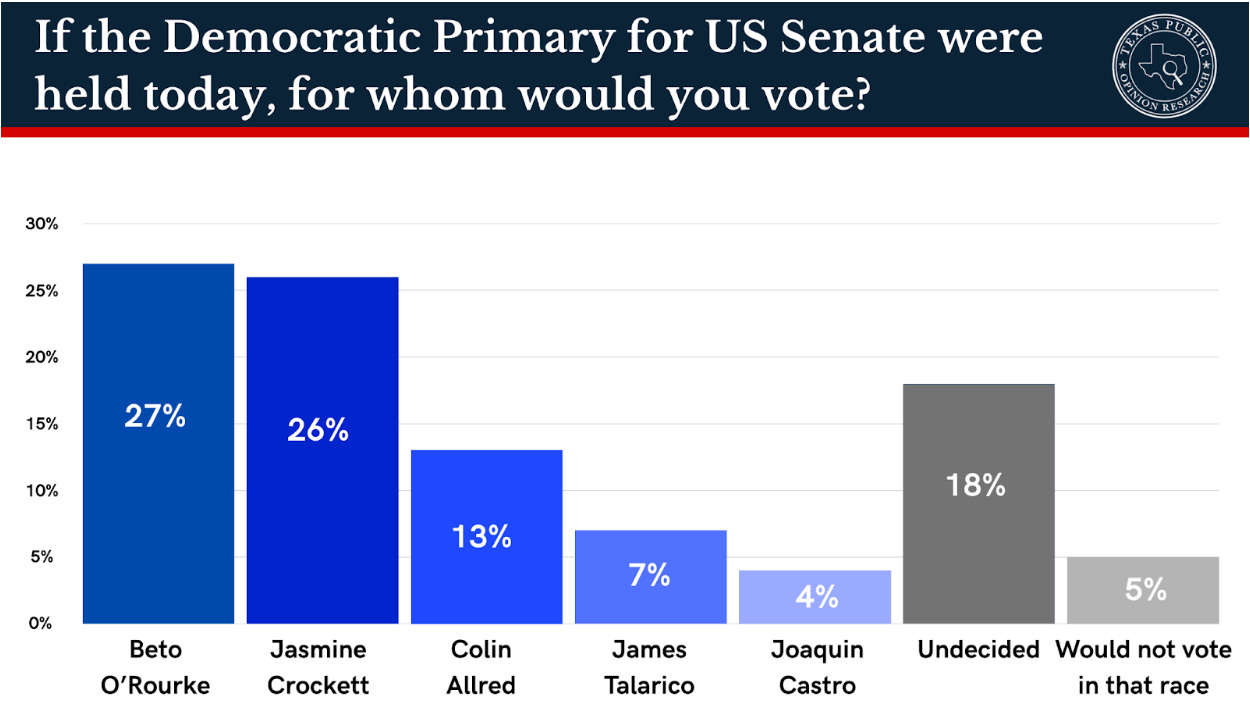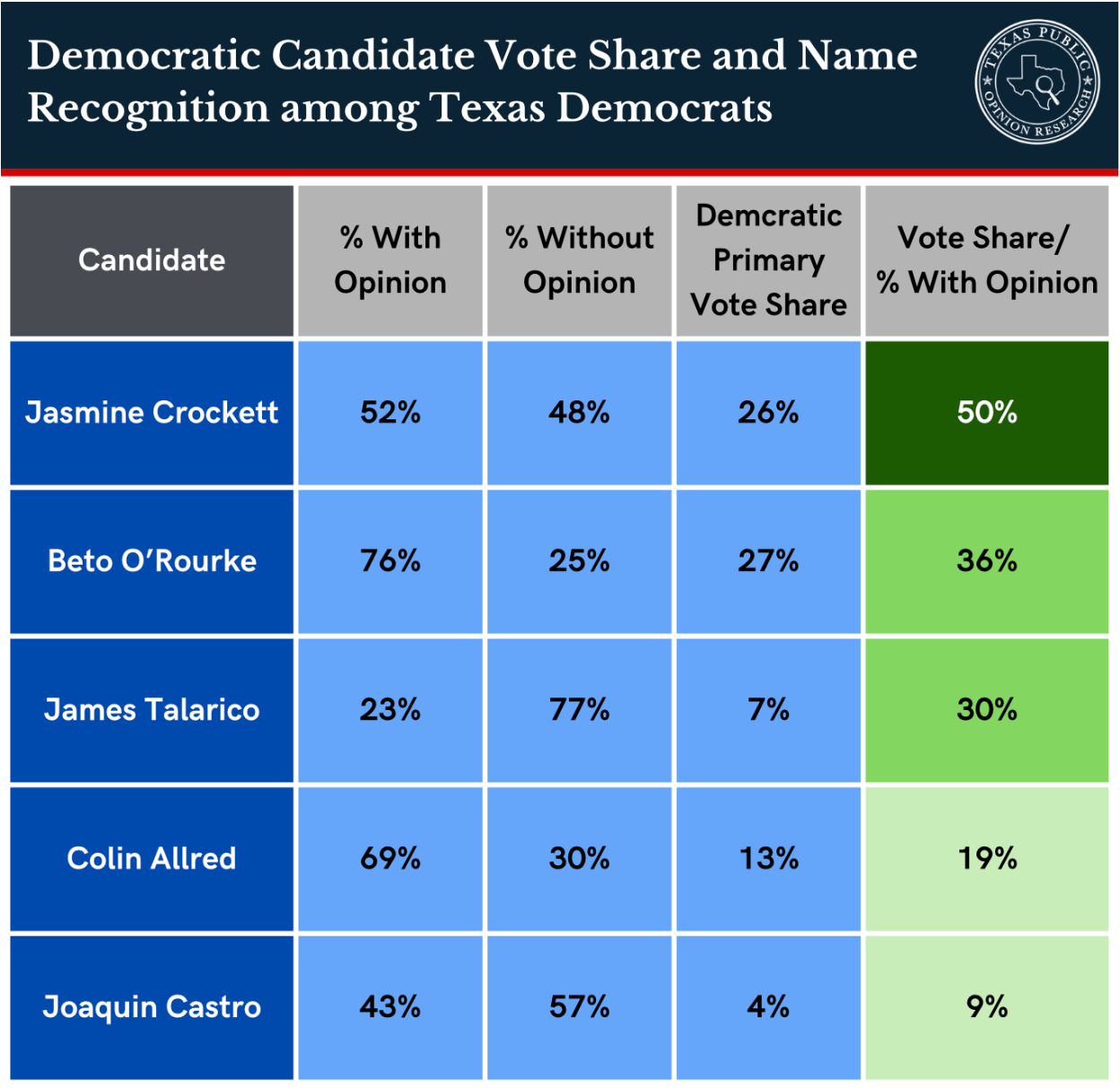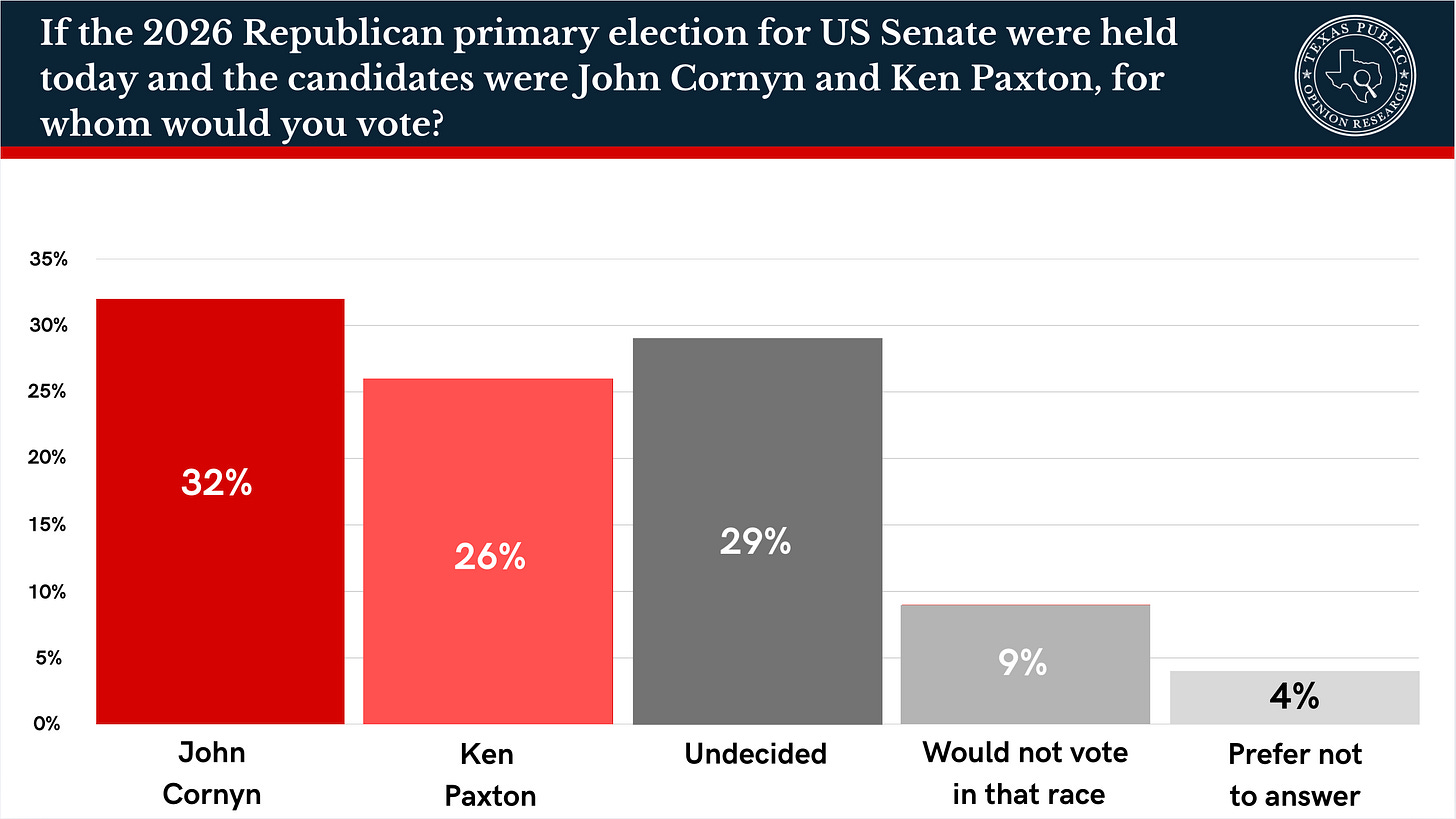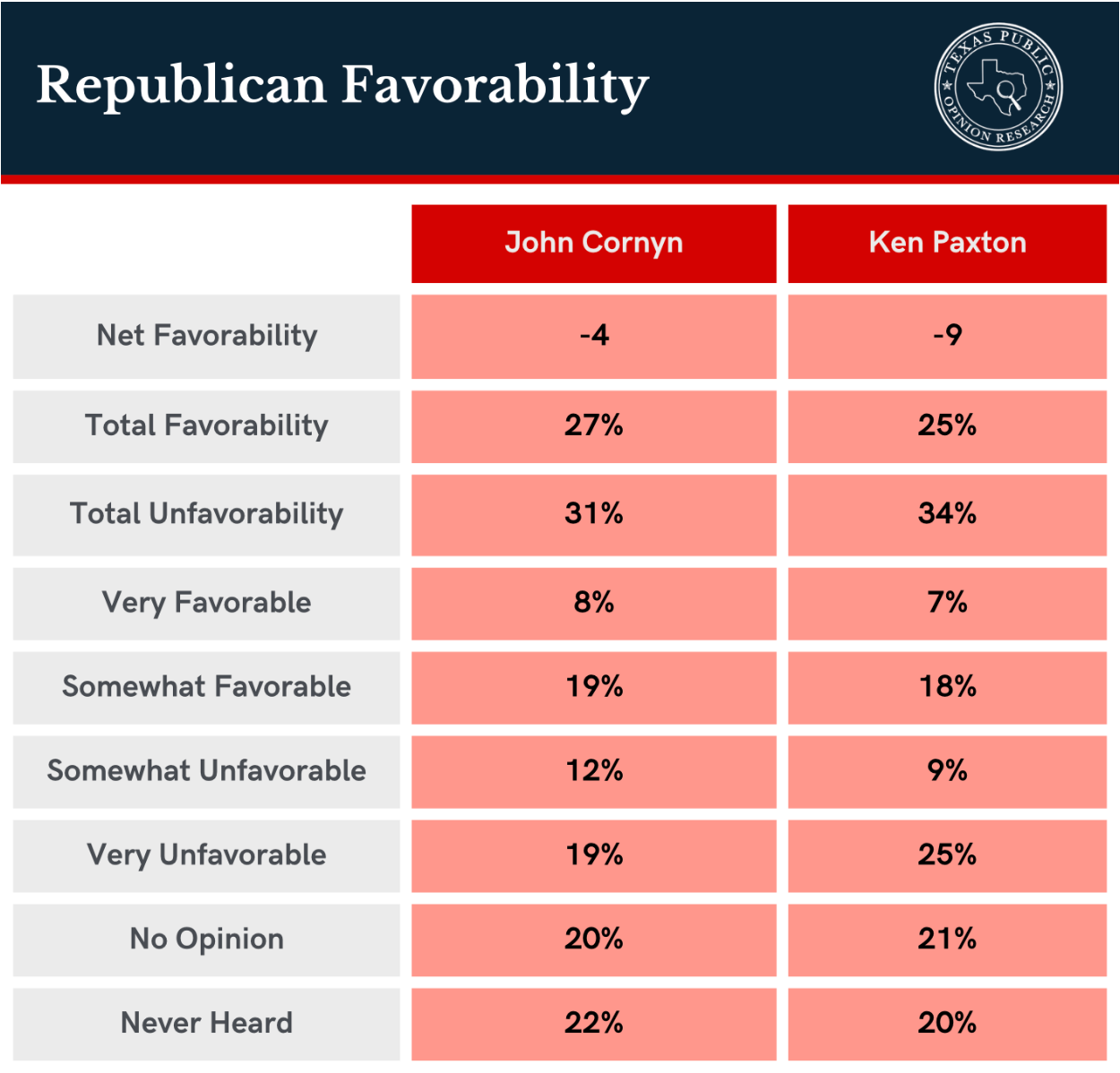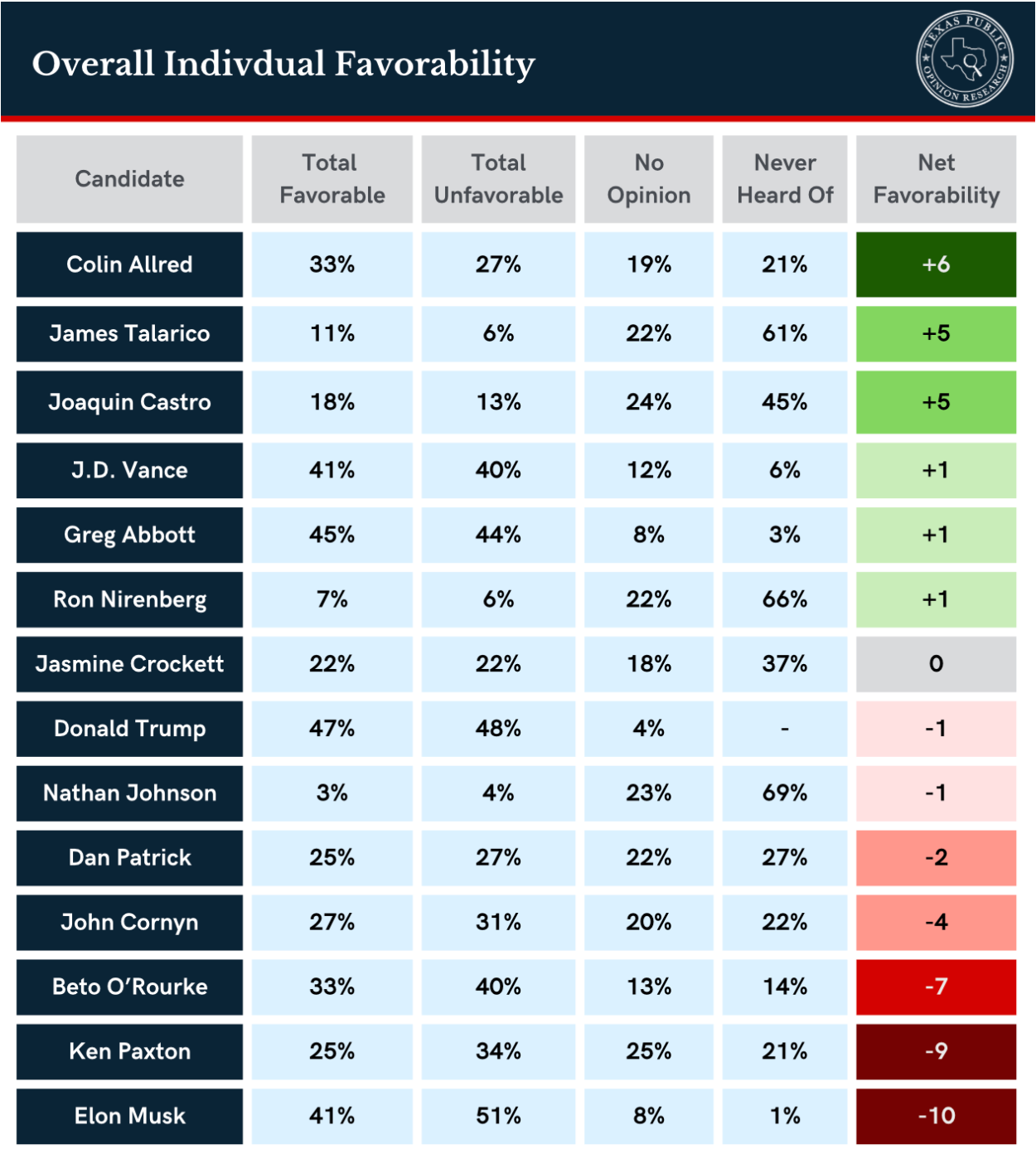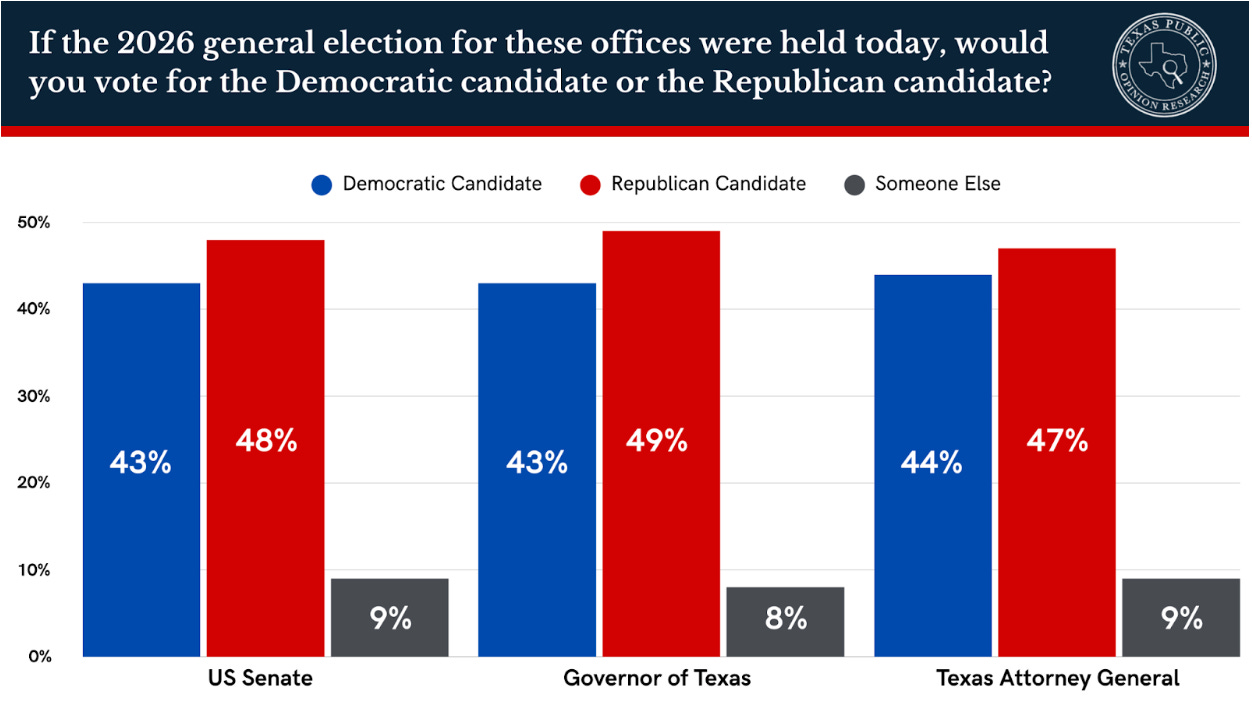Texas Senate Primaries Take Shape as Statewide Races Stay Close
Hey y’all, welcome back! In today’s TPOR installment, we’re diving into the findings from our latest poll on the 2026 Senate race—tracking voter preferences in a hypothetical Democratic primary, and examining the state of play in the Republican primary between John Cornyn and Ken Paxton. We’re also breaking down some fascinating data on general election preferences amongst voters in Texas.
Key Findings
Democratic Senate Primary: Former US Rep. Beto O’Rourke (27%) and US Rep. Jasmine Crockett (26%) lead a hypothetical Democratic primary, followed by former US Rep. Colin Allred (13%), State Representative James Talarico (7%), and US Rep. Joaquin Castro (4%). Eighteen percent of Democrats are undecided.
Republican Senate Primary: In a head-to-head matchup, US Sen. John Cornyn receives 32% support among Republicans, compared to 26% for State Attorney General Ken Paxton. Twenty-nine percent of Republicans are undecided, while 9% of GOP voters say that they would not vote in that race.
General Election Preferences: In a generic US Senate ballot, Republicans lead Democrats 48% to 43%; Republicans also hold similar, slight leads on generic ballots for Governor (49%–43%) and Attorney General (47%–44%).
Democratic Primary
The Senate primary—which has a mix of declared and candidates who may run—is still developing. Currently, our polling finds a divided field and several clusters of candidates. Beto O’Rourke (27%) and current US Rep. Jasmine Crockett (26%) lead the pack among Democratic voters, although neither has formally announced a Senate bid. They are followed by declared candidates Colin Allred (13%) and State Rep. James Talarico (7%). US Rep. Joaquin Castro, who has also not formally entered the race, receives 4% support.
Black voters overwhelmingly support Crockett in the Democratic primary, at 50%, followed by O’Rourke at 13% and Allred at 10%. Latino voters, however, are more evenly divided between O’Rourke (28%) and Crockett (24%), with Allred receiving only 11% of their support.
Talarico’s highest level of support among voters in a hypothetical Democratic primary comes from college-educated voters (14% of whom would vote for him), 45- to 64-year-olds (13%), and white voters (12%). Across all three demographic groups, Allred leads Talarico—holding a one-point advantage among 45- to 64-year-olds (14%), a two-point advantage among college-educated voters (16%), and a three-point advantage among white voters (15%). Allred’s support is strongest among Black, Latino, and non-college-educated voters, all of whom support Allred over Talarico by at least five points.
As the Democratic primary field forms, voter familiarity with the candidates plays a large role. Texas Democrats are most familiar with Beto O’Rourke, who has run multiple statewide campaigns and a presidential campaign, with 76% expressing an opinion of him. 69% have an opinion of Colin Allred, who was the Democratic Senate nominee in 2024. 52% of Democrats have an opinion of Jasmine Crockett, 43% of Joaquin Castro, and just 23% have a view on James Talarico.
Because voters are more familiar with some candidates than others, comparing support levels this early in the race doesn't tell the full story. One potentially useful way to analyze the candidates’ standing is to compare their current level of support in the primary to their name ID among Democrats. This provides a basic estimate of how popular these candidates are among Democratic voters who are familiar with them. On this measure, Crockett leads the pack, with her 26% vote share reflecting 50% of her familiarity level of 52%. O’Rourke’s support is at 36% of his voter familiarity, while Talarico is at 30%. Allred’s support is at just 19% of his familiarity level, while Castro’s support is at 9% of his familiarity level with Democratic voters. Across the field, Crockett has consolidated support among Democratic voters who know her, while Talarico appears to have the most room for growth, due to his limited name recognition.
Republican Primary
The Republican Party primary for Senate reflects a close race. As previous TPOR polling has shown, Senator John Cornyn has a legitimate challenger in State Attorney General Ken Paxton. But unlike TPOR’s March poll, this new survey finds that Cornyn is now in the lead, albeit narrowly.
Cornyn currently leads Paxton 32% to 26% in a hypothetical head-to-head matchup, with 29% undecided. Cornyn’s strongest base of support in the Senate primary comes from older Republicans: half of voters 65 and older say they would back him, compared to just 19% for Paxton. He also performs better among college-educated voters (40% to Paxton’s 26%), and maintains a slim edge with non-college voters. Independents who plan to vote in the Republican primary also tilt toward Cornyn, 29% to 22%.
Both Cornyn and Paxton are widely known (78% of voters are able to identify Cornyn by name, and 80% are able to identify Paxton by name), but Paxton’s favorability is the lowest of any tested candidate at –9. Cornyn also has a negative favorability rating, though less so, at –4.
These numbers suggest that Cornyn has the upper hand for now, but Paxton remains a credible challenger, with especially high levels of support among younger and more ideologically conservative Republicans. Given the variability of the race over the spring and summer, and the single-digit leads TPOR has found for both candidates over the last few months, the Republican primary is shaping up to be vigorously and closely fought.
Favorability and Generic Ballots
Among the broader electorate, the highest favorability ratings are held by Colin Allred (+6), James Talarico (+5), and Joaquin Castro (+5).
Despite currently leading among Democratic voters, Beto O’Rourke has the lowest net favorability of any potential Democratic Senate candidates among the broader electorate, at -7. Notably, Talarico is significantly less well-known than both Allred and O'Rourke: 61% of the electorate has never heard of Talarico, 21% and 14% of the voters were unable to identify Allred and O’Rourke, respectively.
Despite never having run statewide, Jasmine Crockett has succeeded in breaking through to the broader Texas electorate; currently, 44% of the Texas electorate has an opinion of her one way or the other, 37% are unable to identify her by name, and 18% have no opinion of her. However, Texans are split on their opinion of Crockett; 22% view her favorably, and 22% unfavorably across the board. Similarly, US Rep. Joaquin Castro is known to 55% of the Texas electorate, and although he has a higher net favorability (+5), only 11% of Texans view him favorably.
The lowest favorability ratings statewide are held by Elon Musk (-10) and Ken Paxton (-9). John Cornyn (-4) and Lieutenant Governor Dan Patrick (-2) are also underwater. Gov. Greg Abbott is the most popular Texas Republican figure tested in the poll, with a slim positive net favorability of +1 (45% favorable, 44% unfavorable). By contrast, Democrats in the Legislature are viewed more negatively (–5) than their Republican counterparts (+7).
While the polling for their respective Senate primaries shows both parties facing internal divisions, Republicans maintain a modest but consistent single-digit lead in the early polling for the statewide general elections.
In generic statewide matchups, Republicans retain a consistent, but slim, edge of between three and six points, depending on the race. On a generic ballot for US Senate, Republicans lead Democrats by five points, 48% to 43%. The GOP advantage is six points in the governor’s race (49% to 43%), and slightly narrower in the state attorney general race at three points (47% to 44%).
Independents are notably split on the generic ballot: if the election for governor were held today, 39% of independents would support a Republican candidate, while 38% of independents would support a Democratic candidate.
About the Poll
Texas Public Opinion Research (TPOR), a nonpartisan public opinion initiative, today released findings from a statewide survey examining views on potential candidates for the 2026 US Senate race in Texas, as well as favorability ratings and generic ballot preferences. TPOR’s fourth poll—surveying 843 registered voters in Texas—was conducted Aug. 27–Aug. 29. Its margin of error is ±4.6 percentage points. The full topline can be found here, and crosstabs are available upon request.



